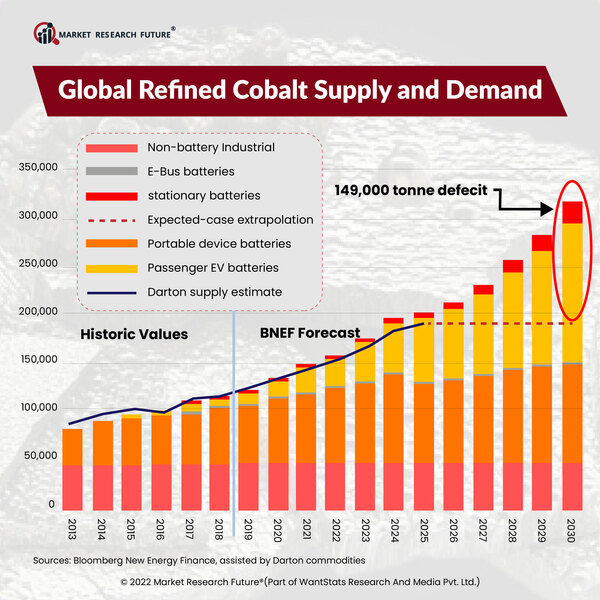Congo's Cobalt Export Ban: Implications For The Global Cobalt Market

Table of Contents
Potential Triggers for a Cobalt Export Ban
Several factors could potentially trigger a cobalt export ban from the DRC. Understanding these triggers is crucial for proactive mitigation.
Political Instability and Resource Nationalism: The DRC's political landscape has historically been volatile, characterized by periods of instability and conflict. Resource nationalism, a policy prioritizing domestic control over natural resources, could motivate the government to impose an export ban, aiming to capture greater economic benefits from its cobalt reserves.
- Examples of past political instability include various armed conflicts and regime changes that have disrupted mining operations.
- A potential motivation for a ban could be a desire to increase government revenue or exert greater control over the mining sector.
- Such a ban would significantly impact foreign investment in the DRC's mining industry, potentially deterring future investment and hindering economic development.
Environmental Concerns and Mining Regulations: Cobalt mining in the DRC, particularly artisanal mining, has caused significant environmental damage. Concerns about unsustainable practices, water pollution, deforestation, and soil erosion could lead to stricter environmental regulations or even a complete ban on exports.
- Artisanal mining contributes significantly to environmental degradation through the use of harmful chemicals and improper waste disposal.
- Increased international pressure for sustainable mining practices could result in stricter regulations leading to production halts or export restrictions.
- The implementation of more stringent environmental standards could necessitate significant investments in sustainable mining technologies, potentially impacting the profitability and competitiveness of DRC cobalt production.
Supply Chain Concerns and Ethical Sourcing: The cobalt mining industry in the DRC has been plagued by ethical concerns, including child labor and human rights abuses. A ban could be imposed in response to international pressure to address these issues and ensure ethical sourcing of cobalt.
- Reports of child labor and unsafe working conditions in artisanal mines have garnered significant international attention.
- Major companies are increasingly implementing due diligence processes to ensure ethical sourcing, but significant challenges remain.
- Growing consumer demand for ethically sourced products could further pressure the DRC government to take action, potentially leading to an export ban.
Impact on the Global Cobalt Market
A Congo's Cobalt Export Ban would have far-reaching consequences for the global cobalt market.
Price Volatility and Supply Shortages: The immediate impact would be a sharp increase in cobalt prices due to drastically reduced supply. This price volatility would ripple through various industries reliant on cobalt.
- Expected price increases could be substantial, potentially leading to market manipulation and speculation.
- The reduced cobalt supply would directly impact EV battery production costs, causing delays and potential price hikes for EVs.
- Industries beyond EVs, including aerospace and medical devices, which utilize cobalt, would also experience disruptions.
Geopolitical Implications and Diversification: A DRC cobalt ban would force a significant geopolitical realignment, pushing other cobalt-producing countries (Australia, Canada, Zambia) to increase their production to meet global demand.
- Increased investment in cobalt mining in alternative locations is likely, triggering a global scramble for resources.
- International organizations will play a crucial role in promoting responsible sourcing and ethical mining practices in other regions.
- Diversification of cobalt sources will become paramount to reduce reliance on a single source and mitigate future supply chain risks.
Impact on the Electric Vehicle Industry: The EV industry would be severely affected, facing production delays, higher vehicle prices, and potentially slowed EV adoption rates.
- Battery price hikes would directly translate into higher EV prices, impacting consumer affordability and demand.
- EV manufacturers' profit margins would be squeezed, forcing them to either absorb increased costs or pass them onto consumers.
- The overall growth trajectory of the EV market could be significantly hampered in the short-to-medium term.
Mitigation Strategies and Solutions
Preventing a Congo's Cobalt Export Ban and ensuring a sustainable cobalt supply requires a multi-pronged approach.
Promoting Sustainable Mining Practices: Investing in and promoting responsible mining technologies, improving worker conditions and safety, and ensuring greater transparency in the supply chain are paramount.
- Implementing advanced mining techniques that reduce environmental impact is crucial.
- Improving worker safety and ensuring fair wages will help alleviate ethical concerns and improve working conditions.
- Greater transparency in the supply chain will enable better traceability and accountability, aiding in the fight against unethical practices.
Investing in Cobalt Recycling and Battery Technology: Investing in cobalt recycling technologies and developing alternative battery technologies that minimize or eliminate cobalt dependence is essential for long-term sustainability.
- Advancements in battery technology, such as solid-state batteries, offer potential solutions to reduce cobalt dependence.
- Economically viable cobalt recycling processes will become increasingly important as a source of secondary cobalt.
- Government incentives and funding for research and development in these areas are crucial for driving innovation.
Strengthening International Cooperation: Stronger international cooperation is crucial to coordinate efforts, share best practices, and implement effective solutions.
- Collaboration between governments, industry players, and NGOs is vital for developing and implementing effective strategies.
- International organizations like the OECD and the UN can play a pivotal role in promoting responsible sourcing and sustainable mining practices.
- Harmonizing regulations and standards across countries will create a level playing field and encourage responsible mining.
Conclusion:
A hypothetical cobalt export ban from the DRC would have catastrophic implications for the global economy. The consequences extend far beyond price volatility, impacting geopolitical stability, ethical sourcing, and the transition to a cleaner energy future. Addressing the underlying issues – sustainable mining practices, ethical sourcing, and technological innovation – is crucial to mitigating the potential risks of a Congo's Cobalt Export Ban. Investing in responsible sourcing and diversification, promoting sustainable mining practices in the DRC, and advancing technological solutions are key to ensuring a secure and stable future for the global cobalt market. Understanding the potential implications of Congo's Cobalt Export Ban is paramount for all stakeholders. Let's work together to prevent this scenario and build a more responsible and sustainable cobalt supply chain.

Featured Posts
-
 Analisis Del Partido Belgica 0 1 Portugal Resumen Y Goles
May 15, 2025
Analisis Del Partido Belgica 0 1 Portugal Resumen Y Goles
May 15, 2025 -
 Celtics Vs Knicks Tatum Credits Knicks Strong Game 1 Showing
May 15, 2025
Celtics Vs Knicks Tatum Credits Knicks Strong Game 1 Showing
May 15, 2025 -
 Novi Napadi Na Mediumite Od Tramp I Na Avi Za Chistka Vo Sudstvoto
May 15, 2025
Novi Napadi Na Mediumite Od Tramp I Na Avi Za Chistka Vo Sudstvoto
May 15, 2025 -
 Oakland Athletics Muncy Added To Roster Second Base Start
May 15, 2025
Oakland Athletics Muncy Added To Roster Second Base Start
May 15, 2025 -
 Analyzing The Rs 400 Target For Baazar Style Retail A Jm Financial Perspective
May 15, 2025
Analyzing The Rs 400 Target For Baazar Style Retail A Jm Financial Perspective
May 15, 2025
